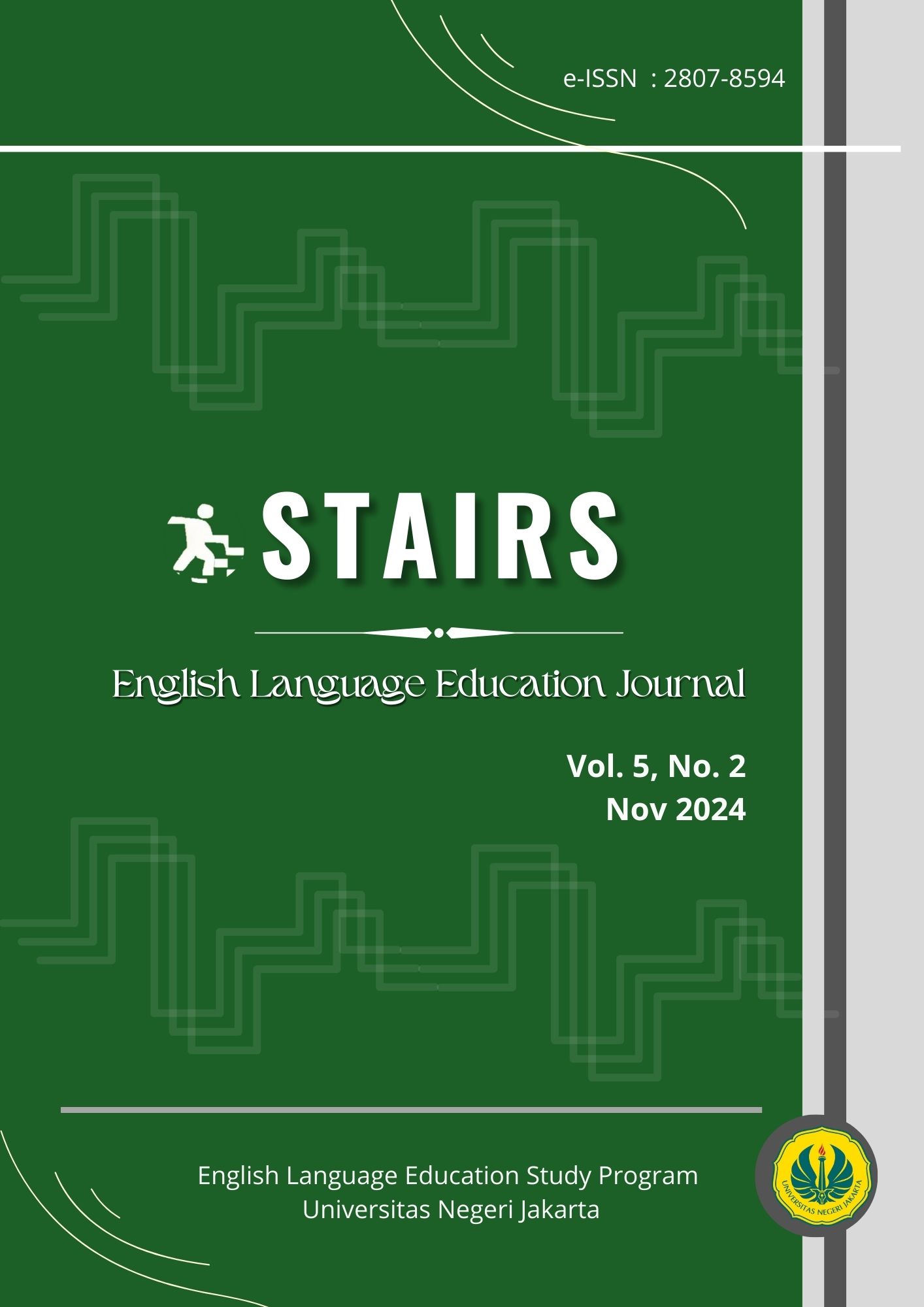Gamifying Education: Exploring Student Perceptions of Kahoot! As a Learning Medium
DOI:
https://doi.org/10.21009/stairs.5.2.1Keywords:
Kahoot, Learning English, Learning Media, Students’ PerceptionAbstract
This study investigates students' perceptions of Kahoot! as a learning medium for English at Sekolah Tinggi Bahasa Asing Technocrat. Employing a qualitative approach, the research gathers data through questionnaires, interviews, and observations. The sample includes 37 students from various academic years who have utilized Kahoot! in both online and offline English classes. The findings indicate a generally positive perception of Kahoot!. Based on the questionnaire results, 47.78% of students demonstrated high motivation to learn English using Kahoot!, attributing this to its competitive features and engaging atmosphere. Students expressed a preference for Kahoot! exercises over traditional textbooks, highlighting the scoring system as particularly motivating. Regarding material comprehension and skill development, 47.98% agreed that Kahoot! enhances their understanding of English materials and improves their language skills. Additionally, students reported that Kahoot! supports material review, fosters supplementary learning, and strengthens vocabulary retention. In terms of the learning process, 64% of respondents agreed that Kahoot! facilitates effective learning by encouraging group collaboration, increasing classroom interaction, and improving material retention compared to conventional teaching methods. Overall, the study concludes that Kahoot! is an effective and engaging tool for teaching and learning English at the tertiary level.
References
Adhitama, M. J., Nadia, H., & Rafidiyah, D. (2022). Implementation of Kahoot! to full lesson for X grade High School students. UrbanGreen Journal, 2(1), 1-5, https://doi.org/10.55756/eim.v2i1.101
Alawadhi, A., & Abu-Ayyash, E. A. S. (2021). Students’ perceptions of Kahoot!: An exploratory mixed-method study in EFL undergraduate classrooms in the UAE. Education and Information Technologies, 26(4), 3629–3658. https://doi.org/10.1007/s10639-020-10425-8
Bakhsh, K., Hafeez, M., Shahzad, S., Naureen, B., & Farid, M. F. (2022). Effectiveness of digital game-based learning strategy in higher educational perspectives. Journal of Education and e-Learning Research, 9(4), 258–268. https://doi.org/10.20448/jeelr.v9i4.4247
Clark, R. C., & Mayer, R. E. (2011). E-learning and the science of instruction: Proven Guidelines for Consumers and Designers of Multimedia Learning (3rd ed.). San Francisco, CA: Pfeiffer.
Darwis, N., & Amal, N. I. (2023). An analysis of students' perception using Kahoot game in the vocabulary learning process. International Journal of Research on English Teaching and Applied Linguistics, 4(1), 1–11.
Dias, S. B., Jelinek, H. F., & Hadjileontiadis, L. J. (2024). Wearable neurofeedback acceptance model for students’ stress and anxiety management in academic settings. PLOS ONE, 19(10), e0304932. https://doi.org/10.1371/journal.pone.0304932
Dicheva, D., Dichev, C., Agre, G., & Angelova, G. (2015). Gamification in education: A systematic mapping study. Educational Technology & Society, 18(3), 1–15.
Hodgkinson-Williams, C., & Mostert, M. (2005). Online debating to encourage student participation in online learning environments: A qualitative case study at a South African university. International Journal of Education and Development using Information and Communication Technology (IJEDICT), 1(2).
Islam, I. D., Syafrizal. S., Juniardi, Y. (2024). Artificial Intelligence in the English classroom: Middle School teachers' and students' perceptions. STAIRS: English Language Education Journal, 5(1), 12-24.
Lestari, S., & Nugraheni, A. S. (2022). The effect of Google Classroom in improving learning motivation and critical thinking skills of university students. AL-ISHLAH: Jurnal Pendidikan, 14(1), 61–70. https://doi.org/10.35445/alishlah.v14i1.973
Licorish, S. A., Owen, H. E., Daniel, B., & George, J. L. (2018). Students’ perception of Kahoot!’s influence on teaching and learning. Research and Practice in Technology Enhanced Learning, 13(1). https://doi.org/10.1186/s41039-018-0078-8
Nurhidayat, E., Mujiyanto, J., Yuliasri, I., & Hartono, R. (2024). Technology integration and teachers’ competency in the development of 21st-century learning in EFL classroom. Journal of Education and Learning (EduLearn), 1*(2), 342–349. https://doi.org/10.11591/edulearn.v18i2.21069
Nuri, H. S.M., Qadir, S.M., Mohammed, R. R., & Azaldin, A. H. (2022). Perceptions of postgraduate students towards the use of Kahoot as a formative assessment tool in an English language course. Journal of University of Raparin, 9(5), 229–251. https://doi.org/10.26750/vol(9).no(5).paper11
Pajarito, J. K. D., Salcedo, M. T., & Fernando, J. S. (2024). The effectiveness of gamification in the learning process of higher education. Psychology and Education: A Multidisciplinary Journal, 17(10), 1082–1088. https://doi.org/10.5281/zenodo.10835091
Pan, L., Tlili, A., Li, J., Jiang, F., Shi, G., Yu, H., & Yang, J. (2021). How to implement game-based learning in a smart classroom? A model based on a systematic literature review and delphi method. Frontiers in Psychology, 12. https://doi.org/10.3389/fpsyg.2021.749837
Qian, M., & Clark, K. R. (2016). Game-based learning and 21st century skills: A review of recent research. Computers in Human Behavior, 63, 50–58. https://doi.org/10.1016/J.CHB.2016.05.023
Ramli, N. H. H., Alavi, M., Mehrinezhad, S. A., & Ahmadi, A. (2018). Academic stress and self-regulation among university students in Malaysia: Mediator role of mindfulness. Behavioral Sciences, 8(1). https://doi.org/10.3390/bs8010012
Rejeki, S. (2021). High School teachers’ and students’ perception of ICT use in learning English. STAIRS: English Language Education Journal, 2(1), 1-8.
Rosdy, S. N. A., & Yunus, M. M. (2021). A systematic review of Kahoot: Perceptions and challenges among English learners and teachers. International Journal of Academic Research in Progressive Education and Development, 10(1). https://doi.org/10.6007/ijarped/v10-i1/9045
Yürük, M. (2023). A qualitative meta-analysis of Kahoot! in language instruction. Education and New Developments, 2023, 1–6.
Zeglen, E., & Rosendale, J. A. (2018). Increasing online information retention: Analyzing the effects of visual hints and feedback in educational games. Journal of Open, Flexible and Distance Learning, 22(1), 22–33. https://doi.org/10.3402/jofdl.v22i1.325



